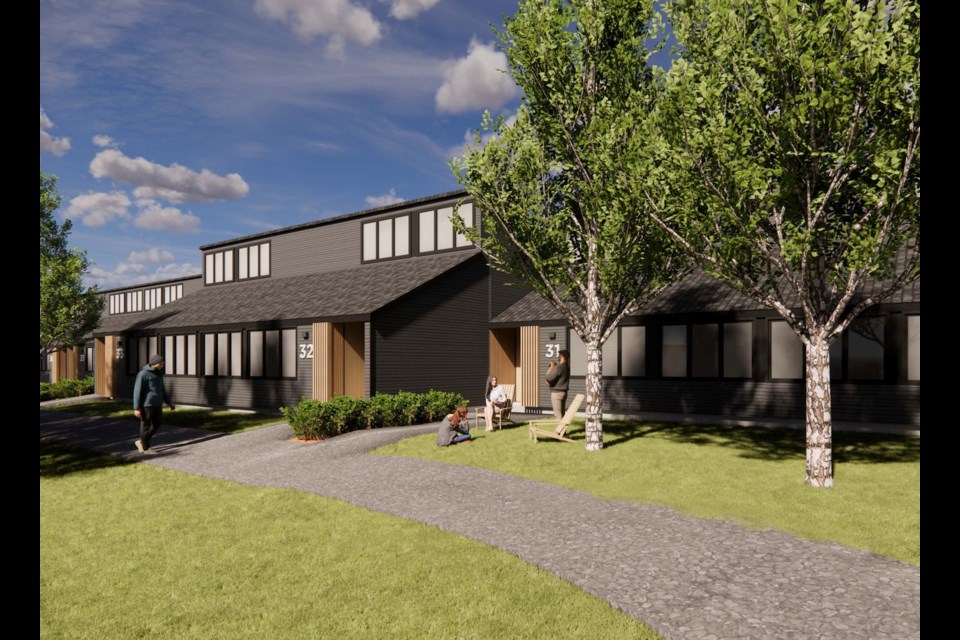Canadore College is taking steps to help create safe, affordable housing for its students.
After hearing from students and stakeholders last summer about a housing shortage in North Bay, the post-secondary school formed a housing strategy task force to explore options.
“We were all hearing that we needed to figure out a way to marry up the concept of enrollment growth and housing supply in the region,” said Shawn Chorney, vice-president of strategic infrastructure, Indigenous and learner services.
The task force established four key areas for investment. First, redevelop on-campus townhouses known as “the Greens,” lease an apartment complex in downtown North Bay, with plans to first renovate and then expand, and finally establish a homestay program, which would connect students with seniors in the community.
According to Chorney, step one is to revitalize 19 of the 39 townhouses on campus. “The Greens” — originally built in the 1970s — are townhouses each with six-bedrooms, a shared kitchen, living room and bathroom. They’ve sat unused for the past 10 years. The buildings were shuttered in 2013 after an assessment found the spaces weren’t conducive for students’ needs.
At that time the school opted to add space to the high-density residences instead.
“We turned the water off, decommissioned ‘the Green’ townhouses, but left them standing for future use and potential,” Chorney explained.
The new version of “the Greens” will be specifically for family housing.
“By investing in family housing we’re actually able to create incredible outcomes in a safe community for families,” Chorney said.
Each of the revitalized units will get new windows, doors and insulation, along with a new kitchen. Each will be upgraded with high-efficiency heating. The plans for “the Greens” represent a $7.5-million investment for Canadore.
“It is a fairly aggressive timeline and push, but the beautiful thing is the footings are in, the main structure walls are up,” he said. “We’re not starting from scratch.”
“The Greens” will also reflect environmental considerations, not just with the redevelopment of existing space, but Chorney said building conditions and retrofitting will factor in. Plus they’ll be diverting waste from the renos.
“We’ve assessed what we can salvage; so doors, windows, furniture and things like that are actually being pulled out and being made available to the public,” he said.
About half of the 19 townhouses are expected to be ready by this September, with the remainder completed by January 2024. Canadore will then determine what should be done with the remaining 20 units.
Want to read more stories about business in the North? Subscribe to our newsletter.
Also part of the college’s plans to address the housing shortage is to lease a building downtown on Commercial Street. It’s the building formerly used by the regional health unit. Chorney said they’re renovating the complex into both one- and two-bedroom apartments.
“The owner was willing to entertain the creation of 21 apartments in that building with us,” he said, adding that the complex is bright with lots of windows, and will have a security system similar to what’s on campus.
Canadore students will be able to start renting the apartments by July. If needed, four of the units will be available for employee housing.
Once renovations are finished, Chorney said the next step will be expanding the complex.
Canadore is finishing the designs for an addition on the building, which would add another 32 two-bedroom apartments. Construction is expected to start on those this summer.
Chorney is also excited about Canadore’s new homestay program meant to reduce social isolation.
“We’ve heard a lot from seniors that interact with us — there are hundreds every week — that they’d love to have a student live with them, but they don’t want to advertise that they live alone,” he explained.
“So we’re actually going to be creating a bit of a matchmaking program where we’ll match our students to seniors based on interests, needs and backgrounds.”
Mentors will work with students to help the seniors “stay in their homes and be comfortable,” while both matches provide cultural, social and emotional support to one another.
Chorney said the school is planning to host monthly activities like dinners and movie nights on campus for the students and their seniors.
“We’re trying to leverage up all of the relationships we have to be a good community partner, and it just makes sense,” Chorney said. “We can actually help students find housing and do something really good for the community at the same time.”
The solutions Canadore is investing in are expected to “take some pressure off” the need for more local housing.
Given an expected enrollment growth in both domestic and international students, Chorney is confident the upgrades at “the Green” townhouses on campus, the renovation and addition at the downtown apartment complex, and the Homestay program will align with both enrollment and housing needs.
“We know it’s a drop in the bucket to help the broader [housing shortage] issue in the community around safe housing for students, affordable housing, affordable housing for seniors.”




